Israel's Bennett Tests Positive For COVID As Mideast Gathering In Progress
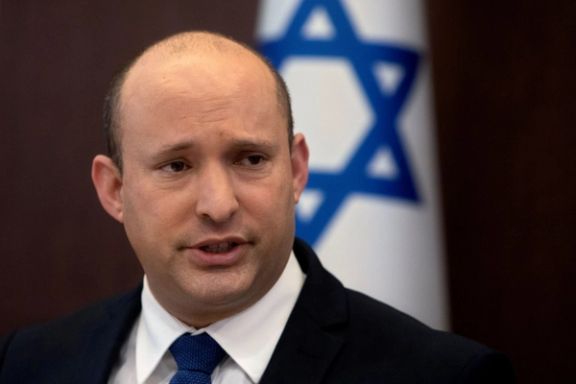
Israeli Prime Minister Naftali Bennett has tested positive for COVID-19 but feels well and will work while self-isolating at home, his office said on Monday.

Israeli Prime Minister Naftali Bennett has tested positive for COVID-19 but feels well and will work while self-isolating at home, his office said on Monday.
The news came hours after Bennett, who has been vaccinated against the coronavirus and received a booster dose, visited the scene of a shooting in the Israeli city of Hadera, where two Arab gunmen killed two police officers before being shot dead.
"This morning, the prime minister will conduct an assessment ... of last night's attack," Bennett's office added in a statement.
US Secretary of State Anthony Blinken will test for COVID-19 on Monday after having met Bennett in Jerusalem the previous day, a State Department spokesperson said.
"Upon learning of Prime Minister Bennett's positive test result, we determined that only Secretary Blinken is considered a close contact. He will follow all CDC guidance, including by masking and undergoing appropriate testing," spokesperson Ned Price said.
Bennet is in Israel for a two-day visit to attend a landmark meeting with allied Arab countries and Israel. The United Arab Emirates, Bahrain, Egypt and Morocco, the so-called Abraham Accords counties, and Israel will discuss regional issues and US nuclear talks with Iran.
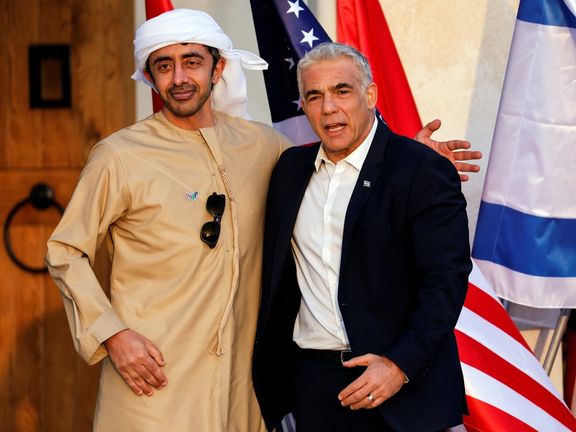
Representatives from Arab allies of Israel are arriving to attend a multilateral meeting with US Secretary of State Anthony Blinken expected to focus on Iran.
Morocco’s Foreign Minister Nasser Bourita and Bahraini FM Abdulatif Al Zayani arrived in Israel Sunday evening to attend a six-way regional meeting to discuss “advancing regional security” especially against the Iranian threat.
Emirati Foreign Minister Abdullah bin Zayed Al Nahyan touched down at Nevatim Air Base in southern Israel ahead of the start of the Negev Summit this evening.
According to the participants, the meetings so far have been “very warm including embraces and friendly conversation.”
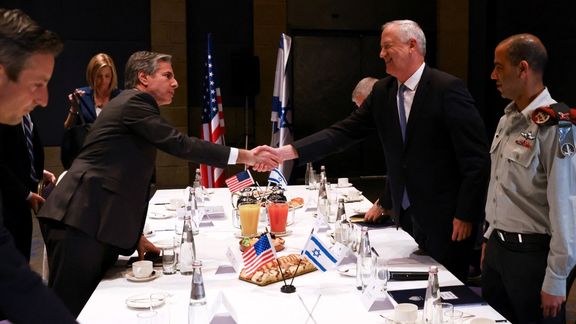
Opposition leader Benjamin Netanyahu praises the arrival of several Arab ministers ahead of the Negev Summit, saying, “It’s a direct result of the Abraham Accords we brought… the strengthening of the Abraham Accords is a good thing for peace, it’s good for Israel.”
He said he believes Blinken is “making a big mistake” on Iran, adding “Iran without a nuclear agreement is a poor country, an isolated county, a country that has no international legitimacy and no immunity from a military option… Iran with a nuclear agreement becomes a rich country with hundreds of billions of dollars which they’ll use for terror and aggression.”
The top diplomats are holding discussions and meeting on Sunday and Monday.
Leaders of Egypt, Israel and the United Arab Emirates also met on March 22 in the Egyptian resort town of Sharm el-Sheikh.

Iran’s health minister has confirmed that the government has eliminated a major subsidy for medicines, a move some see as a death sentence for many people who cannot afford market prices.
Minister Bahram Einollahi said on Sunday that manufacturers will no longer receive cheap dollars from the government to import raw materials, meaning they should buy dollars at a fivefold higher rate on the exchange market.
The public relations manager prof the ministry said, however, that the change hasn’t been finalized yet and the supply of medicine with cheap dollars is still going on.
Social media users say such a decision would be “an obvious and deliberate act of mass murder!”
Earlier in March, Iran’s parliament decided to scrap an annual subsidy of up to $15 billion for essential food and medicines, despite warnings of more inflationand hardship, but there were speculations that the government would make an exception for medicine.
The idea to eliminate the subsidy emerged after hardliner president Ebrahim Raisi (Raeesi) assumed office in August and could count on backing from conservatives and ultra-conservatives in control of Iran’s parliament.
The subsidy was introduced in April 2018 when former US president Donald Trump signaled his intention to withdraw from the Obama-era nuclear agreement with Iran known as JCPOA, and Iran’s national currency began to nosedive. Prices for imported goods skyrocketed and the government decided to provide cheap dollars to importers of essential goods to keep prices low.

Iran-backed Lebanese militant group Hezbollah has reportedly made a pact with a Russian private paramilitary group to send its forces to fight in Ukraine.
According to Israel Hayom on Sunday, unconfirmed reports from different sources in Saudi Arabia and Lebanon say the Shiite group will send as many as 800 operatives to fight alongside Russian troops in Ukraine, in exchange for Hezbollah getting the green light to buy weapons from Russian defense contractor Almaz-Antey.
The deal was reportedly reached in Latakia between the head of Hezbollah's security unit Naji Hassan al-Shartouni and a Russian official named Alexander Kuznetsov from the Wagner Group -- the de facto private army of Russian President Vladimir Putin.
The report cited Lebanon's Sawt Beirut International website as saying that Hezbollah has opened a recruitment office in Al-Qusayr, in western Syria following the meeting between Shartouni and Kuznetsov.
Saudi media outlet Al-Hadath said on Friday that the Iranian proxy group plans to send 200 operatives to Russia, with the rest joining them later, adding that the troops will be paid a monthly wage of $1,500 each.
Earlier in March, Hezbollah leader Hassan Nasrallah denied reports that any of its forces are fighting alongside Russians after General Staff of the Armed Forces of Ukraine released a statement saying that around 1,000 fighters from the Iran-backed group and Syria were recruited to fight in Ukraine.
On March 11, Russian President Vladimir Putin approved deploying up to 16,000 “volunteers” from the Middle East to fight alongside Russian forces.
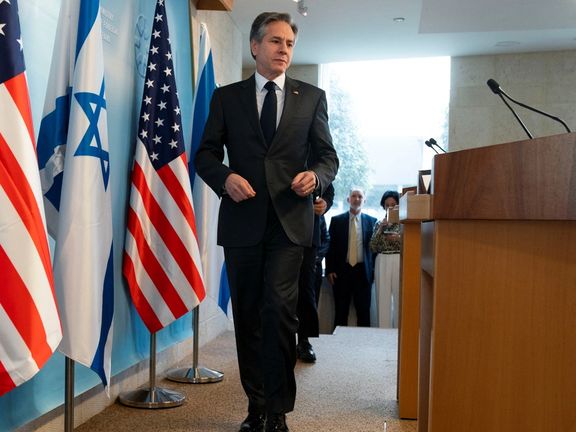
Israel and the United States will cooperate in preventing a nuclear-armed Iran despite some disagreements, foreign minister Yair Lapid said on Sunday.
"We have disagreements about a nuclear agreement and its consequences, but open and honest dialogue is part of the strength of our friendship. Israel and the United States will continue to work together to prevent a nuclear Iran”, Lapid said during a joint press conference with US Secretary of State Antony Blinken.
An unnamed Israeli official has said the multilateral meeting between the US, UAE, Bahrain, Morocco and Egypt on Sunday has a clear message for the Islamic Republic.
Egypt and Jordan were not formally invited to the meeting that is described as a summit for the signatories of the Abraham Accords, the normalization pacts which US brokered between Israel and several Arab states.
On Friday, Jordan’s King Abdullah II hosted Abu Dhabi Crown Prince Sheikh Mohammed bin Zayed Al-Nahyan, Egyptian President Abdel Fattah el-Sissi, and Iraqi Prime Minister Mustafa al-Kadhemi in the Red Sea port city of Aqaba for a “consultative brotherly meeting dealt with recent international and regional developments”.
Leaders of Egypt, Israel and the United Arab Emirates also met on March 22 in the Egyptian resort town of Sharm el-Sheikh.
Except a mention of the Ukraine crisis and Iran, there is little information about what were discussed in all these meetings before Blinken’s arrival in the region but it could be part of efforts to present a united regional front on Iran issues.
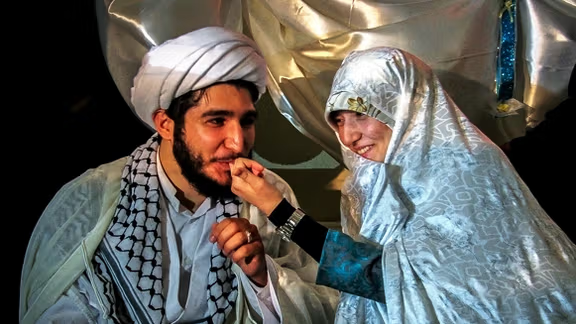
This article is the fifth in a series about Iran’s Shiite clerics, explaining how they study, get a clerical rank, get married and what they do for a living.
--------------------------------------------------------------------------------------------------------------------------
In an article meant to warn young women against marrying a cleric, Seyyed Yaser Taqavi, a new-generation Iranian cleric born in 1991, says getting married to a cleric is not as easy some may have seen in Iranian movies.
Everyone in Iran knows that Islam encourages marriage. But still, everyone knows that getting married is one of the most difficult things to do for a variety of financial, cultural and other reasons.
For clerics, however, marriage is one of the few ways of what sociologists call "upward mobility." In a country where nepotism is a prevalent practice, almost every cleric and non-cleric who is in a position of power in Iran owes his position at least partly to kinship.
President Ebrahim Raisi is the son-in-law of Mashhad Friday Prayer Imam Ahmad Alamolhoda. Former Majles Speaker Ali Larijani is the son-in-law of Ayatollah Morteza Motahari. The children and grandchildren of the founder of the Islamic Republic Ruhollah Khomeini are married to the children and grandchildren of other prominent clergymen, such as Ayatollah Soltani in Qom and Ayatollah Khatami in Yazd, most of whom are or were in positions of power.

Supreme Leader Ali Khamenei's eldest son Mostafa is married to the daughter of Ayatollah Khoshvaght and his other son Mojtaba is married to the daughter of former Parliament Speaker Gholamali Haddad. One of his daughters is the daughter-in-law of his chief of staff Mohammad Mohammadi Golpayegani. Almost every minister in every Iranian cabinet was and is somehow linked to a clerical clan. So, getting married to the right family is important for any cleric and vice versa.
Unlike most universities where students pay a tuition fee to study, seminary students receive a monthly stipend (shahriyeh) from their main teacher, usually an influential ayatollah. The money is barely enough to make ends meet, but the amount differs for students at different levels. Married clerics earn more than single clerics and male students get more than female students. Yes! There are female clerics too, but they study atseparate places where no man can see them. Even teachers lecture from behind a curtain and most female clerics have small jobs at the ministry of education.
Currently the best paid clerical students get between 15 to 45 million rials or $60-170 a month. The stipend has increased in recent years due to rising inflation. The total money spent on stipends is massive but there is no definite figure. For instance, according to Hawzah News, there are 7,000 clerical students only in Mazandaran Province, which has no major religious center. The number is nuch higher in Qom or Mashhad.

However, for many seminary students the hardship on living on a stipend is the price to pay for social mobility.
Getting married to someone from a big and influential clerical clan facilitates employment in well-connected entities where clerics and others can get hefty salaries. Choosing the right family may give the young cleric a position of power and its financial windfall.
But finding access to money and power is not the only reason for clerics to look for a spouse from a clerical family. There are also social reasons. Most Iranians resent the political power of the clergy, which makes them unpopular among young women and in some cases their parents.
According to Taqavi, most clerical students get married before completing their seminary studies. Very few of them get married to female seminary students because they can hardly meet them. For most, brides are chosen by their families through an arranged marriage. Generally, according to Taqavi, clerics are said to be good husbands, as they fear God and want to maintain a good social standing.
Taqavi says that some seminarians coming from non-clerical families sometimes find themselves shunned by their families for choosing to become a cleric. In this case, their families are unlikely to help them find a bride. So, they seek help from their teachers and seminary officials to act as go-betweens with the family of the bride to be.
Unlike the customs in ordinary families, the meetings where families ask for the bride's hand are segregated with men and women sitting in separate rooms. However, the couple find a chance to talk privately, of course, while the families listen from behind the door.
There is no music or dance in most clerical wedding ceremonies, although in some cases women, segregated from men, do play music and dance. In rare occasions the guests have been seen enjoying eulogies about the birth of Shi'ite saints.
"Becoming the wife of a cleric will not guarantee that you go to paradise. Even the clerics' own transition to paradise after their death is not guaranteed. But you can be sure that clerics really love their wives," says Taqavi.